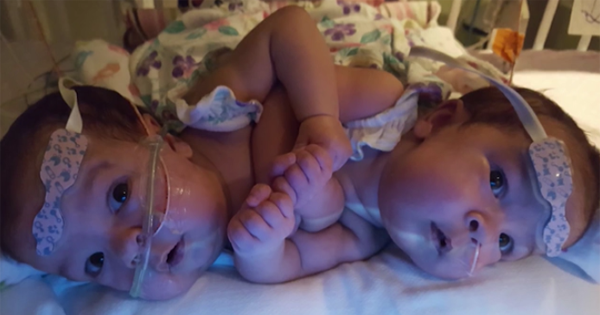Advertisement
Twenty weeks into Jacquelyn’s pregnancy, she and her husband, Mark, were told that their twin daughters were joined to the other at the liver, sternum, diaphragm, and heart.
Statistically, very few conjoined twins make it to birth, and barely 5% of the twins who have live births even survive.
For Jacquelyn and Mark’s twins, Scarlett and Savannah, given the fact that they were joined at such a vital organ, their chance of survival was even lower.
Rather than let these odds discourage them, Jacquelyn and Mark only fought harder to find a way to allow their girls to survive. This led them to seek a second opinion from Dr. Jennifer Co-Vu at the University of Florida Health Shands Children’s Hospital.
Dr. Co-Vu took another look at Scarlett and Savannah’s conjoined parts and determined that their heart was actually two, very small hearts attached by the atrium – not just one, singular organ.
It was, in fact, possible to separate the twins. It would just be extremely difficult.
After Scarlett and Savannah were born, doctors took CT and MRI scans of their internal organs to create 3-D models, to best figure out how to separate the two girls and ensure their survival. Vessels would have to be cut during the separation procedure, but the doctors were able to at least minimize the damage done.
The operation took eight excruciatingly long hours – but it was successful.
Scarlett made a quick recovery while Savannah was a little swollen for a while longer, but they would both survive the separation procedure in full health.
Now, three months after their birth, and several skin operations later, Scarlett and Savannah are finally strong enough to return home with their parents. Savannah will likely have to return to the hospital to check on a slowly developing congenital heart condition, but the doctors aren’t overly concerned.
Dr. Mark Bleiweis, director of the Congenital Heart Center at the UF Hospital, said the twins’ “recovery has been astronomical. To see them thrive in the ICU then come off the ventilator and now getting ready to be discharged, it’s really exciting.”
You can watch the official news footage here:




